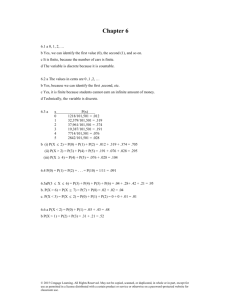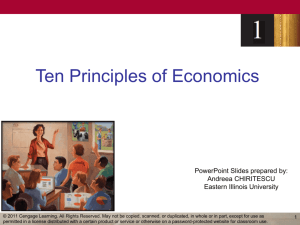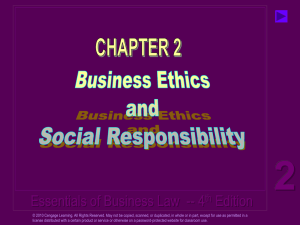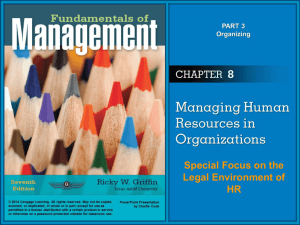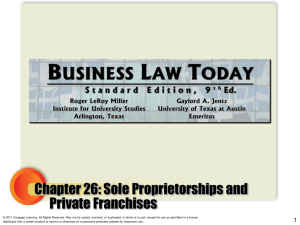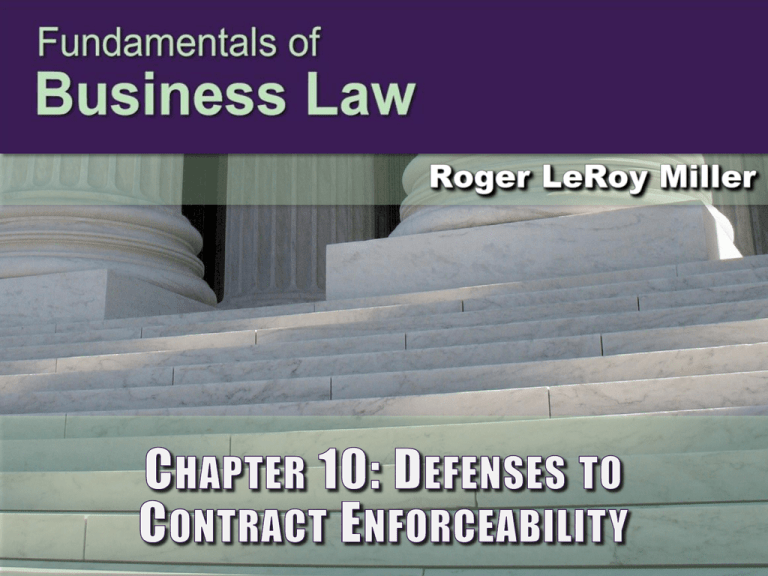
Chapter 1: Legal Ethics
Learning Objectives
1. In what types of situations might
voluntary consent to a contract’s
terms be lacking?
2. What is the difference between a
mistake of value or quality and a
mistake of fact?
3. What are the elements of
fraudulent misrepresentation?
© 2013 Cengage Learning. All Rights Reserved. May not be copied, scanned, or duplicated, in whole or in part, except for use as
permitted in a license distributed with a certain product or service or otherwise on a password-protected website for classroom use.
Learning Objectives
4. What contracts must be in writing
to be enforceable?
5. What is parole evidence? When is it
admissible to clarify the terms of a
written contract?
© 2013 Cengage Learning. All Rights Reserved. May not be copied, scanned, or duplicated, in whole or in part, except for use as
permitted in a license distributed with a certain product or service or otherwise on a password-protected website for classroom use.
Voluntary Consent
A contract may be unenforceable if
the parties have not genuinely
assented to its terms by:
–Mistake.
–Misrepresentation.
–Undue Influence.
–Duress.
© 2013 Cengage Learning. All Rights Reserved. May not be copied, scanned, or duplicated, in whole or in part, except for use as
permitted in a license distributed with a certain product or service or otherwise on a password-protected website for classroom use.
Voluntary Consent
Mistakes.
–Mistakes of Fact vs. Mistakes of Value
(or Quality).
• Only a mistake of fact allows a contract to
be voided.
© 2013 Cengage Learning. All Rights Reserved. May not be copied, scanned, or duplicated, in whole or in part, except for use as
permitted in a license distributed with a certain product or service or otherwise on a password-protected website for classroom use.
Voluntary Consent
Mistakes.
–Unilateral Mistakes of fact cannot be
canceled unless:
• Other party to the contract knows or
should have known, OR
• Mistake was due to an inadvertent
mathematical mistake and was not gross
negligence.
© 2013 Cengage Learning. All Rights Reserved. May not be copied, scanned, or duplicated, in whole or in part, except for use as
permitted in a license distributed with a certain product or service or otherwise on a password-protected website for classroom use.
Voluntary Consent
Mistakes.
–Bilateral (Mutual) Mistakes: concerns
the same material fact, and can be
rescinded by either party.
• CASE 10.1 L&H CONSTRUCTION CO. V. CIRCLE
REDMONT, INC. (2011). Do you agree the
parties made a mutual mistake?
© 2013 Cengage Learning. All Rights Reserved. May not be copied, scanned, or duplicated, in whole or in part, except for use as
permitted in a license distributed with a certain product or service or otherwise on a password-protected website for classroom use.
Ex. 10-1 Mistake of Fact
© 2013 Cengage Learning. All Rights Reserved. May not be copied, scanned, or duplicated, in whole or in part, except for use as
permitted in a license distributed with a certain product or service or otherwise on a password-protected website for classroom use.
Voluntary Consent
Fraudulent Misrepresentation.
–Contract is Voidable by Innocent Party.
–Consists of the following Elements:
• Misrepresentation of Material Fact.
• Intent to Deceive.
• Reliance on Misrepresentation.
• Injury to the Innocent Party.
© 2013 Cengage Learning. All Rights Reserved. May not be copied, scanned, or duplicated, in whole or in part, except for use as
permitted in a license distributed with a certain product or service or otherwise on a password-protected website for classroom use.
Voluntary Consent
Undue Influence.
–Contract lacks voluntary consent and is
voidable.
• Confidentiality, Fiduciary, or Relationship of
Dependence.
• Undue Influence or Persuasion is presumed
if a weaker party talked into doing
something not beneficial to him or herself.
© 2013 Cengage Learning. All Rights Reserved. May not be copied, scanned, or duplicated, in whole or in part, except for use as
permitted in a license distributed with a certain product or service or otherwise on a password-protected website for classroom use.
Voluntary Consent
Duress.
–Forcing a party to enter into a contract
under fear or threat makes the contract
voidable.
–Threatened act must be wrongful or
illegal and render person incapable of
exercising free will.
–Threat of civil suit is not duress.
© 2013 Cengage Learning. All Rights Reserved. May not be copied, scanned, or duplicated, in whole or in part, except for use as
permitted in a license distributed with a certain product or service or otherwise on a password-protected website for classroom use.
Statute of Frauds—
Writing Requirement
Statute of Frauds requires certain
contracts to be in writing and signed
to be enforceable.
Contracts involving Interests in Land.
The One-Year Rule.
–A contract that by its terms cannot be
performed within 1 year of execution.
© 2013 Cengage Learning. All Rights Reserved. May not be copied, scanned, or duplicated, in whole or in part, except for use as
permitted in a license distributed with a certain product or service or otherwise on a password-protected website for classroom use.
Ex. 10-2 One Year Rule
© 2013 Cengage Learning. All Rights Reserved. May not be copied, scanned, or duplicated, in whole or in part, except for use as
permitted in a license distributed with a certain product or service or otherwise on a password-protected website for classroom use.
Statute of Frauds—
Writing Requirement
Collateral Promises.
–Contracts to answer for the debt of
another.
–Primary vs. Secondary Obligations.
–Exception: The “Main Purpose” Rule:
Oral promise is covered by Statute of
Frauds unless guarantor is seeking a
personal benefit.
© 2013 Cengage Learning. All Rights Reserved. May not be copied, scanned, or duplicated, in whole or in part, except for use as
permitted in a license distributed with a certain product or service or otherwise on a password-protected website for classroom use.
Statute of Frauds—
Writing Requirement
Promises Made in Consideration of
Marriage.
–Prenuptial agreements are “more”
enforceable if consideration is involved.
Contracts for Sale of Goods over
$500.
–See Chapter 13, UCC Article 2.
© 2013 Cengage Learning. All Rights Reserved. May not be copied, scanned, or duplicated, in whole or in part, except for use as
permitted in a license distributed with a certain product or service or otherwise on a password-protected website for classroom use.
Contracts Subject to
the Statute of Frauds
© 2013 Cengage Learning. All Rights Reserved. May not be copied, scanned, or duplicated, in whole or in part, except for use as
permitted in a license distributed with a certain product or service or otherwise on a password-protected website for classroom use.
Statute of Frauds—
Writing Requirement
Exceptions to the Statute of Frauds.
– Partial performance.
• Purchaser has paid part of purchase price,
taken possession and made valuable
improvements to property.
– Admissions.
• Party admits in court records contract exists.
– Promissory Estoppel/Detrimental Reliance.
• Promisee justifiably relies.
© 2013 Cengage Learning. All Rights Reserved. May not be copied, scanned, or duplicated, in whole or in part, except for use as
permitted in a license distributed with a certain product or service or otherwise on a password-protected website for classroom use.
Sufficiency of the Writing
What Must Be Contained.
–“Writing” includes memorandum,
invoice, fax, check, email.
–Essential terms sufficient.
–Signed by party against whom
enforcement is sought.
• CASE 10.2 BENEFICIAL HOMEOWNER SERVICE
CORP. V. STEELE (2011).
© 2013 Cengage Learning. All Rights Reserved. May not be copied, scanned, or duplicated, in whole or in part, except for use as
permitted in a license distributed with a certain product or service or otherwise on a password-protected website for classroom use.
Parol Evidence Rule
© 2013 Cengage Learning. All Rights Reserved. May not be copied, scanned, or duplicated, in whole or in part, except for use as
permitted in a license distributed with a certain product or service or otherwise on a password-protected website for classroom use.
Parol Evidence Rule
Prohibits the introduction at trial of
evidence of the parties prior
communications that contradicts the
written contract.
© 2013 Cengage Learning. All Rights Reserved. May not be copied, scanned, or duplicated, in whole or in part, except for use as
permitted in a license distributed with a certain product or service or otherwise on a password-protected website for classroom use.
Parol Evidence
Exceptions (allow parol evidence):
– Evidence of subsequent contract
modifications
– Oral evidence to show contract was void
or voidable.
– Show meaning of ambiguous Terms.
– To “fill in the gaps.”
© 2013 Cengage Learning. All Rights Reserved. May not be copied, scanned, or duplicated, in whole or in part, except for use as
permitted in a license distributed with a certain product or service or otherwise on a password-protected website for classroom use.
Parol Evidence
Exceptions (allow parol evidence):
– Prior Dealings, course of performance,
usage in trade.
– Obvious Clerical Error.
• CASE 10.3 WATKINS V. SCHEXNIDER (2010).
What exception to the parol evidence rule
applied in this case?
© 2013 Cengage Learning. All Rights Reserved. May not be copied, scanned, or duplicated, in whole or in part, except for use as
permitted in a license distributed with a certain product or service or otherwise on a password-protected website for classroom use.
Parol Evidence
Integrated Contracts.
–Is the written contract intended to be a
complete and final statement of the
terms of the agreement?
–If “yes”, then the contract is “integrated.”
–Can be fully or partially integrated.
–Courts exclude any parol evidence that
contradicts the writing.
© 2013 Cengage Learning. All Rights Reserved. May not be copied, scanned, or duplicated, in whole or in part, except for use as
permitted in a license distributed with a certain product or service or otherwise on a password-protected website for classroom use.


